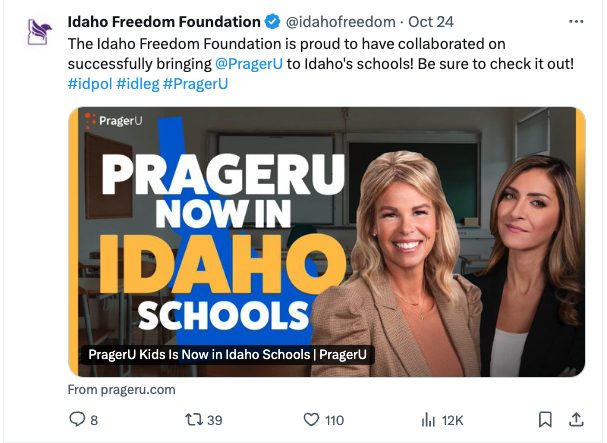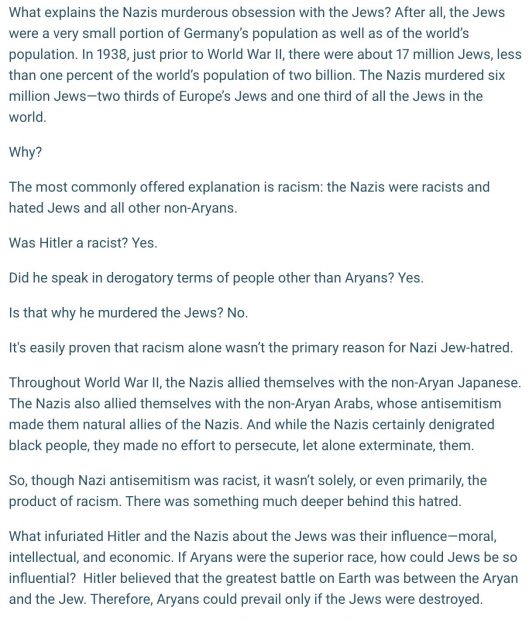Idaho stakeholders have had divided reactions — ranging from celebration to concern — to state superintendent Debbie Critchfield’s endorsement of PragerU’s controversial curriculum for Idaho K-12 students.
The Idaho partnership is just the most recent for PragerU, a conservative nonprofit that has been teaming up with state education departments to provide right-leaning curriculum to schools nationwide. Idaho teachers are not required to use the curriculum, but can with board approval.
The Idaho Freedom Foundation, a hardline conservative nonprofit, was quick to take credit for and tout Idaho’s adoption of the curriculum in a social media post Thursday.

EdNews Monday asked the Freedom Foundation for more details about its involvement, but had not heard back as of Wednesday morning. The Freedom Foundation has a policy of not responding to reporters.
Critchfield “worked directly with the content provider and did not have interactions with IFF,” Scott Graf, the communications director for the Idaho Department of Education, wrote in an email.
Others have voiced concerns about the content — including members of Idaho’s Jewish and Native American communities.
Holocaust education nonprofit leader emails Critchfield, says PragerU materials lack necessary context
Kali Cusimano is the executive director and co-founder of the Council for Holocaust Awareness of Idaho (CHAI), a nonprofit that aims to provide resources for Holocaust and antisemitic education. She emailed Critchfield Friday with concerns about the PragerU curriculum.
“Accurate and comprehensive teaching is essential to combat antisemitism and prevent Holocaust distortion and denial,” Cusimano wrote. “Unfortunately, materials from sources like PragerU often lack the necessary context, which can lead to misunderstandings and harmful narratives.”
Cusimano offered CHAI’s time and support “to ensure that materials chosen for the classroom will provide the necessary context that our Idaho students deserve.”
As of 12:30 p.m. on Tuesday, Cusimano said she had not yet received a response.
In an email to EdNews, Cusimano said the PragerU video linked below — which provides a five-minute overview of the Holocaust — is problematic: “It offers little detail and only highlights a small amount of the atrocities committed from 1933 to 1945.”
How a PragerU video discusses racism and the Holocaust
Below is an excerpt from the video transcript. You can watch the video in full here.

She said the video excludes important context, such as the Nuremberg Laws, more information about antisemitism, and how “under Hitler, Jews were viewed as a race, not merely an ethnicity or religion.”
“The fact that the video states the Holocaust was not because of racism is problematic because there are multiple factors that played a part in the escalation of the Holocaust, with racism/antisemitism being one of them,” Cusimano wrote.
“Without a true understanding of the Holocaust, students can easily fall victim to believing stories of distortion and denial without realizing they are false because they were not given a foundation of facts in the classroom,” she continued. “Idaho cannot afford to fail our students in this incredibly important topic.”
When the Holocaust is not taught, or is not taught in a responsible manner, there are real-life consequences for Jewish students, she said. Cusimano’s own son has been taunted and bullied at a Treasure Valley public school for being Jewish.
“It hurts as a parent to see how little antisemitism is understood and how rampant it is in our schools,” Cusimano said. “Having real, responsible Holocaust education will not end antisemitism by any means, but it can help students understand what those comments and jokes about the Holocaust truly mean.”
Native American nonprofit leader distressed by PragerU content
tai simpson, the founder and organizer of the nonprofit Indigenous Idaho Alliance, was distressed by PragerU’s content about Native Americans. simpson, who is Nimiipuu (Nez Perce) and Black, said the content erases and diminishes Indigenous experiences.
The curriculum is “limited in scope,” “cherry-picks pieces of history,” and deflects “from the reality of what’s happened and the atrocities that have taken place in this country,” said simpson, who prefers her name to be written in lowercase.
In one PragerU video, for example, presenter Jeff Flynn-Paul says “the idea that any one piece of land belonged to any one tribe, for more than 50 or 100 years, is highly doubtful. The idea that the Europeans stole land which had belonged in perpetuity to any one tribe is ludicrous. This is the basic math of all human history: if you can defend your land, you can keep it. If you can’t, you lose it.”
simpson said that comment is based on European understandings of land ownership, and ignores Indigenous ways of thinking.
“Indigenous people don’t own land, we steward it,” she said. “When we say ‘land back,’ we want to steward the land, because when white people started to own it, they depleted the resources … This is the land that we stewarded for thousands and thousands of years, and that’s what we expect to be recognized and honored.”
Flynn-Paul also characterizes Europeans’ impact on Native Americans as a passive and inevitable consequence of their arrival: “The claims of genocide by disease have almost nothing to do with European actions apart from their simply reaching the New World.”
And he downplays and normalizes war, ethnic cleansing, and Native American deaths: “There is hardly a single civilization on Earth, which did not displace natives, or which did not engage in nasty wars or ethnic cleansings at many points during its history. No matter who ‘discovered’ the New World, it is inevitable that a large proportion of its inhabitants would have died within the first few decades after first contact.”
How a PragerU video discusses Europeans’ impacts on Native Americans
Below are some excerpts from the video transcript. You can watch the video in full here.
simpson said Flynn-Paul’s viewpoint is narcissistic and gaslights Native Americans: “Somebody commits harm against a person and then wants to tell the story of how they were the victim. That’s exactly what this curriculum does,” she said.
Violence against tribes was state-sanctioned and intentional, simpson said, and aimed to weaken and destabilize communities in order to more easily take their land.
“It’s really … hard to exist as a person of color in this state,” simpson said. “It pisses me off to know that my nieces and my cousin’s children … will have to fight to ensure that their identity is known and celebrated across history and time.”
Teachers’ union questions curriculum vetting, calls for teacher involvement
Mike Journee, director of communications for the Idaho Education Association, expressed doubt about the curriculum in a Tuesday email: “It is unclear if this curriculum has been vetted to ensure it meets Idaho’s content standards. If so, our members and other educators were not part of that process as far as we are aware.”
In an interview Thursday, Critchfield said state-level content and curriculum staff members had worked with PragerU and determined the curriculum met the standards.
While Critchfield endorsed the curriculum last week, teachers will not be able to use it unless their school boards approve it. Journee encouraged teachers to get involved in those discussions at the local level.
“We hope each school district that considers adopting this curriculum has a robust community discussion that includes parents and educators,” he wrote.
